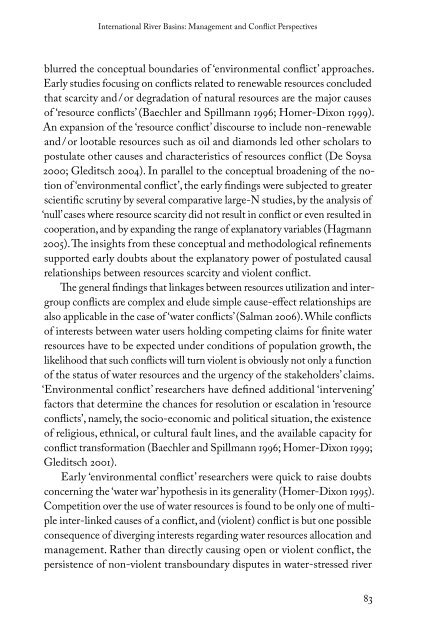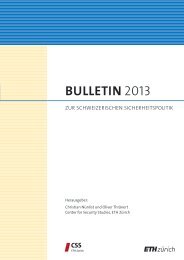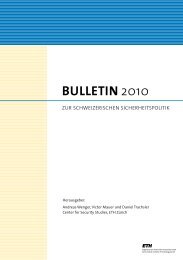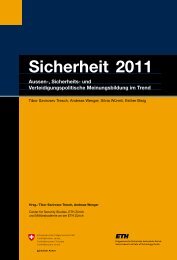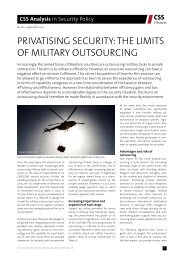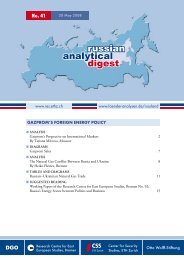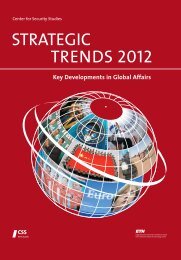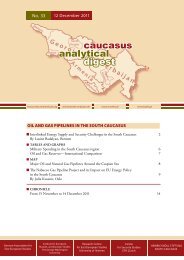Double-Edged Hydropolitics on the Nile - Center for Security Studies ...
Double-Edged Hydropolitics on the Nile - Center for Security Studies ...
Double-Edged Hydropolitics on the Nile - Center for Security Studies ...
You also want an ePaper? Increase the reach of your titles
YUMPU automatically turns print PDFs into web optimized ePapers that Google loves.
Internati<strong>on</strong>al River Basins: Management and C<strong>on</strong>flict Perspectives<br />
blurred <strong>the</strong> c<strong>on</strong>ceptual boundaries of ‘envir<strong>on</strong>mental c<strong>on</strong>flict’ approaches.<br />
Early studies focusing <strong>on</strong> c<strong>on</strong>flicts related to renewable resources c<strong>on</strong>cluded<br />
that scarcity and / or degradati<strong>on</strong> of natural resources are <strong>the</strong> major causes<br />
of ‘resource c<strong>on</strong>flicts’ (Baechler and Spillmann 1996; Homer-Dix<strong>on</strong> 1999).<br />
An expansi<strong>on</strong> of <strong>the</strong> ‘resource c<strong>on</strong>flict’ discourse to include n<strong>on</strong>-renewable<br />
and / or lootable resources such as oil and diam<strong>on</strong>ds led o<strong>the</strong>r scholars to<br />
postulate o<strong>the</strong>r causes and characteristics of resources c<strong>on</strong>flict (De Soysa<br />
2000; Gleditsch 2004). In parallel to <strong>the</strong> c<strong>on</strong>ceptual broadening of <strong>the</strong> noti<strong>on</strong><br />
of ‘envir<strong>on</strong>mental c<strong>on</strong>flict’, <strong>the</strong> early findings were subjected to greater<br />
scientific scrutiny by several comparative large-N studies, by <strong>the</strong> analysis of<br />
‘null’ cases where resource scarcity did not result in c<strong>on</strong>flict or even resulted in<br />
cooperati<strong>on</strong>, and by expanding <strong>the</strong> range of explanatory variables (Hagmann<br />
2005). The insights from <strong>the</strong>se c<strong>on</strong>ceptual and methodological refinements<br />
supported early doubts about <strong>the</strong> explanatory power of postulated causal<br />
relati<strong>on</strong>ships between resources scarcity and violent c<strong>on</strong>flict.<br />
The general findings that linkages between resources utilizati<strong>on</strong> and intergroup<br />
c<strong>on</strong>flicts are complex and elude simple cause-effect relati<strong>on</strong>ships are<br />
also applicable in <strong>the</strong> case of ‘water c<strong>on</strong>flicts’ (Salman 2006). While c<strong>on</strong>flicts<br />
of interests between water users holding competing claims <strong>for</strong> finite water<br />
resources have to be expected under c<strong>on</strong>diti<strong>on</strong>s of populati<strong>on</strong> growth, <strong>the</strong><br />
likelihood that such c<strong>on</strong>flicts will turn violent is obviously not <strong>on</strong>ly a functi<strong>on</strong><br />
of <strong>the</strong> status of water resources and <strong>the</strong> urgency of <strong>the</strong> stakeholders’ claims.<br />
‘Envir<strong>on</strong>mental c<strong>on</strong>flict’ researchers have defined additi<strong>on</strong>al ‘intervening’<br />
factors that determine <strong>the</strong> chances <strong>for</strong> resoluti<strong>on</strong> or escalati<strong>on</strong> in ‘resource<br />
c<strong>on</strong>flicts’, namely, <strong>the</strong> socio-ec<strong>on</strong>omic and political situati<strong>on</strong>, <strong>the</strong> existence<br />
of religious, ethnical, or cultural fault lines, and <strong>the</strong> available capacity <strong>for</strong><br />
c<strong>on</strong>flict trans<strong>for</strong>mati<strong>on</strong> (Baechler and Spillmann 1996; Homer-Dix<strong>on</strong> 1999;<br />
Gleditsch 2001).<br />
Early ‘envir<strong>on</strong>mental c<strong>on</strong>flict’ researchers were quick to raise doubts<br />
c<strong>on</strong>cerning <strong>the</strong> ‘water war’ hypo<strong>the</strong>sis in its generality (Homer-Dix<strong>on</strong> 1995).<br />
Competiti<strong>on</strong> over <strong>the</strong> use of water resources is found to be <strong>on</strong>ly <strong>on</strong>e of multiple<br />
inter-linked causes of a c<strong>on</strong>flict, and (violent) c<strong>on</strong>flict is but <strong>on</strong>e possible<br />
c<strong>on</strong>sequence of diverging interests regarding water resources allocati<strong>on</strong> and<br />
management. Ra<strong>the</strong>r than directly causing open or violent c<strong>on</strong>flict, <strong>the</strong><br />
persistence of n<strong>on</strong>-violent transboundary disputes in water-stressed river<br />
83


